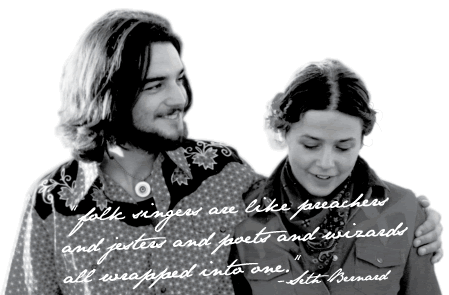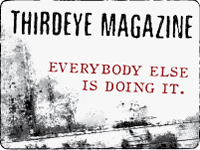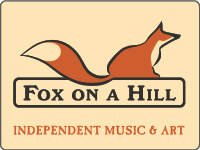
More and more we’re all becoming victim to the cookie-cutter, one size-fits all mentality which has resulted from the continued “malling” (or is it mauling?) of America. We are wearing the same clothes, shopping in the same big-box stores, listening to the same music, eating the same monocrops and experiencing the same monoculture. Thankfully there are some who have continued to actively resist this rapid decline in cultural diversity, by breaking the chains of conformity and making unique contributions to more localized community-based enterprises. This is the driving force behind Earthwork Music, an ever-growing collective founded by folk musician Seth Bernard in 2001. According to the collective’s mission statement, they are responding to the homogenization of mainstream music by working to create and promote original, independent music while raising community and self-awareness.
Today Earthwork Music has developed into a dedicated assortment of friends, including 12 different recording artists. With the help of his inseparable partner, the talented Daisy May Erlewine (Her album, “Heart Song,” is Earthwork’s bestselling record), Bernard’s collective has come far since its humble beginnings. In the fall of 2001, Seth released his first self-recorded album, “Hello Fellow Travelers,” on a trailer stage behind the barn at the 183-acre Earthwork farm in Missaukee County.
The farm, which inspired the name of the collective, was founded in the late seventies by his parents in an attempt to return to a lifestyle based upon self-reliance, communal living, ecology, and spiritual growth. Growing up on the Earthwork Farm provided an environment well-suited to foster the development of Seth’s creativity and imagination. Seth, along with his older sisters, experienced a strong sense of community and had the chance to make friends with all kinds of beings. Peacocks, goats, Scottish Highland cows, chickens, turkeys, Peace Corp volunteers, old-thyme string-band musicians, and performing artists-to name a few. Most importantly, he had the freedom to experiment and explore. “There were big open fields, thick magical woodlots, rusty junkyards and funky old farm buildings to play in. And then I noticed there were the guitars, fiddles, pianos, banjos, mandolins and saxophones for playing,” says Bernard. From helping his father with beekeeping and learning how their society works better than our own, to listening to his mother singing while she worked in her massive organic gardens, the lessons of life on the farm were carried into fruition with the creation of Earthwork Music.
After building a stage inside the Earthwork barn in 2002, word quickly spread of Seth’s endeavor. Seth explains: “Dan Kahn led Luke Winslow-King, Steppin’ In It, myself and some friends in a review of Woody Guthrie’s songs and stories called ‘From California to the New York Island.’ From then on, we were in new territory. We’d found each other, and we’d found Woody Guthrie.” Then, about two years ago, May Erlewine came into the picture. From sewing every single compilation CD to designing the Earthwork Music website, May has done more than anyone to move the project forward. What? Sewing compilation CDs? This is but one example of the values of Earthwork Farm translating into the operation of Earthwork Music. Many of their albums come in different kinds of paper sleeves and each one is sewn together by Daisy May. Two CD packages can be obtained from an 11″ x 17″ sized paper very little waste. Earthworkers get together with friends, watch movies, cut, fold, sew and stuff liner notes and stickers, while burning CDs. “We like things to have a personal touch. We try to put as much care as possible into our albums, start to finish,” says Bernard. May’s family has also been extremely supportive of the collective, even going so far as to donate a building for their use.
“Ahhh… I love you, Dick Cheney. All that greed’s bad for your heart, come climb this tree with me.”
The new Earthwork Music headquarters is housed within a large, white building in Big Rapids. The complex belonged to Erlewine’s father, who had used the building for his businesses Matrix Software and the popular All-Music guide. Once the collective has finished moving in, they will have a fully-equipped video studio, audio studio, mail room, conference room, offices and a house next door for team members to live or stay in. This is not to say activities will cease at the Earthwork Farm. The farm will continue to host two annual events: Earthwork Harvest Gathering (the third weekend in September) and the newly-created Earthwork Family Weekend, an educational festival-camp developed for parents and children (the fourth weekend in June). Meanwhile, work has begun on “The Earthwork Occasional” which will be released sometime in 2006. The newsletter/zine will include recipes, comics, updates, articles and interviews with partners and collaborators. It will also spread interest in Earthwork’s artists with the release of lyrics and chords.
In addition, there are plans in the works for a myriad of events aimed at raising environmental awareness. “Earthwork Music is dedicated to preserving our environment. We are all the environment. Saving ourselves from irreparable social-environmental devastation is the main deal. We’re all going to need to do more than we’ve already done,” says Bernard. Earthwork artists perform at about 20 benefit concerts a year, and are networking with environmental groups such as SEEDS (see the “Something Fresh” write up on page six). These types of actions will continue to expand with the implementation of new workshops, camps, school programs, and conferences. Currently, a Water Festival and Energy Fair in Mackinaw City is being planned with the help of a large community of social-environmental first response groups (August 18-20). “We can save the Great Lakes from corporate hands with enough community networking, music and free snacks,” quips Seth.
A common thread runs throughout all of these actions: using music as a catalyst to bring about cultural change. According to the folk-singer, “Music inherently brings us together beyond our constructed boundaries. We’re walking around with all these names and numbers and titles and all this baggage hanging on us. But when we’re really inside a musical experience-no matter how big or small-we can enter a different realm.” It’s this realm where epiphanies occur; the place where individuals realize they are a smaller part of a greater whole. To Bernard, this means we are all even a part of Dick Cheney. “If Dick Cheney is part of the one thing, I’d better hold him up to my heart and love him if I want peace. It’s important. Ok… ‘Ahhh… I love you, Dick Cheney. All that greed’s bad for your heart, come climb this tree with me. No, I’m not kidding, just give it a try. That’s it Dick, doesn’t it feel good? Free energy! There’s soul in the soil! There’s no false intelligence around here. It’s all alive, it’s all connected, and it’s all sustainable. It loves you too Dick. Breathe in deep, that there’s fresh air. This is what we call ‘Local Culture.’ This is the stuff dreams are made of!'”
By reclaiming local culture, Earthwork Music has become a part of a broader movement of individuals who are voting with each dollar they choose to spend at a home-grown enterprise instead of a transnational corporation. By “going local,” it’s possible to maintain wisdom and diversity which would otherwise be lost forever. In the end, it’s not the musicians who deserve all the credit but the countless teachers, farmers, volunteers, non-profits, and the nameless individuals who donate their gift of time to make the world a better place.
Written by Jason and Mallory Glover





No Comments so far ↓
There are no comments yet...Kick things off by filling out the form below.